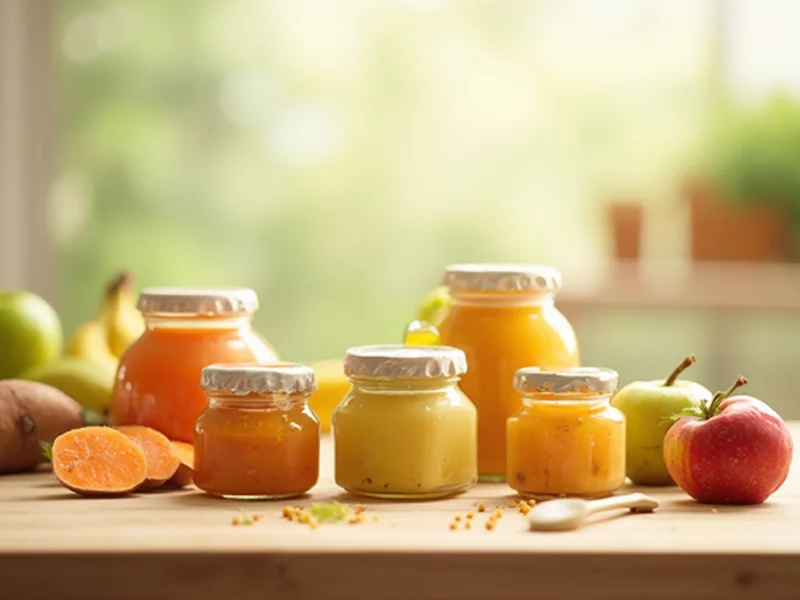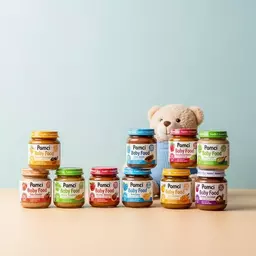Stage 1: Infants (0-6 Months)
- •Primary nutrition: Breast milk/formula.
- •Introduce solids around 6 months.
- •Consult pediatrician for guidance.
Portion: 1-2 tbsp pureed food once a day (starting at 4-6 months).
As you navigate the world of baby nutrition, your choices set the stage for your child's lifelong eating habits. Understanding their nutritional needs at different stages can feel overwhelming, but with the right guidance, it can become an enriching journey. Ready to explore?
This visual summarizes the key nutritional recommendations and age-appropriate portion sizes for infants, toddlers, and young children, highlighting developmental stages and feeding guidelines. For a deeper dive into how different brands meet these needs, consider exploring our guide on choosing baby food brands wisely.
Portion: 1-2 tbsp pureed food once a day (starting at 4-6 months).
Portion: 2-3 meals/day, 2-4 tbsp each meal + snacks.
Portion: 1/4 to 1/3 cup each food group, adjust to cues.
As a parent, it's essential to grasp the nutritional needs of your child at various stages of their development. Each age brings its unique requirements, and understanding them can help you make informed decisions about what to feed your little one. From the first few months of life to those toddler tantrums, nutrition plays a crucial role in healthy growth and development!
In the first six months, your baby relies primarily on breast milk or formula. This stage is all about establishing a strong nutritional foundation. It's important to know that breast milk is packed with antibodies and nutrients that are vital for your baby's immune system. If you're considering formula, choose one that closely mimics breast milk.
As your baby approaches the six-month mark, they’ll be ready to explore new flavors! This is an exciting time to start introducing baby food, but always keep their safety and preferences in mind. For comprehensive guidance on this important milestone, refer to our article on introducing solid foods at 6 months.
The transition to solid foods can be both fun and challenging! At this stage, aim to offer a variety of textures and tastes. Your child is beginning to develop preferences, so let them explore different foods. Remember to keep it safe and appropriate for their age.
Let your little one lead the way in discovering what they like. It's all part of building a positive relationship with food!
As your child grows into a toddler, their nutritional needs continue to evolve. Between the ages of 1 to 3, a balanced diet becomes crucial. It’s essential to include a mix of fruits, vegetables, grains, and protein sources to ensure they're getting a well-rounded diet.
At this age, you can also start to introduce them to more complex flavors and textures. It’s a great time for meals to become a family affair, making the experience enjoyable for everyone!
Your pediatrician is an invaluable resource when it comes to your child's nutrition. They can offer personalized advice based on your child's development and any specific concerns you may have. Regular check-ups are a great opportunity to discuss feeding schedules and dietary choices.
Ultimately, your pediatrician is there to support you in providing the best nutrition for your child. Don’t hesitate to reach out with questions or concerns!
Did you know? Offering your child a variety of colors on their plate not only makes meals more visually appealing but also encourages them to try new foods! Aim for a rainbow of fruits and vegetables to ensure they receive a broad spectrum of nutrients essential for their growth and development.
As parents, we all want the best for our little ones, especially when it comes to their nutrition! Choosing the right baby food can be a daunting task, but understanding key considerations can make it much easier. Let’s recap some important factors to keep in mind as you navigate this journey.
These elements will not only help you choose the best products for your child but also instill confidence in your feeding choices. Remember, every child is unique, and what works for one might not work for another. Listening to your baby’s cues is essential!
Introducing your child to healthy eating early on can set them up for a lifetime of good habits! Start by making mealtime fun and engaging. Try incorporating these strategies:
By actively involving your child in the process, you help them develop a positive relationship with food. Don't hesitate to experiment with different recipes and flavors, as this can turn eating into an adventure!
Knowing how much your child should eat at various stages is crucial. Here’s a simple guide to help you get started:
Portion sizes can vary, so adjust according to your child's hunger cues. As a parent, trust your instincts and let your child guide you on how much they need. Every meal is an opportunity to nurture their growth!
Now that you’ve got a solid understanding of making informed choices, it’s time to explore further resources that can support you and your baby’s nutrition journey!
These resources can provide valuable insights and help you stay informed about the best practices in baby nutrition.
Utilizing interactive tools can make it easier to find baby food that suits your needs. Consider these options:
By using these tools, you can tailor your baby's nutrition to better suit their individual needs!
Making homemade baby food is a fantastic way to ensure your child receives a diverse range of nutrients. Below are some easy recipes you can try:
These recipes not only provide essential nutrients but also allow you to control the ingredients and flavors your baby is exposed to. Plus, it can be a fun bonding experience in the kitchen! For more ideas, check out our homemade baby food recipes guide.
A1: Solid foods should typically be introduced around 6 months of age. It's important to look for signs of readiness, such as good head control and interest in food, and always consult with your pediatrician before starting solids.
A2: For the first six months, breast milk or formula is the primary and most crucial source of nutrition for infants. These provide all the necessary nutrients for their rapid growth and development.
A3: For toddlers aged 6-12 months, aim for 2-3 meals per day, with each meal consisting of 2-4 tablespoons of pureed, mashed, or chopped foods, along with appropriate snacks. Always adjust portions based on your child's hunger cues.
A4: Pediatricians can provide personalized advice based on your child's individual development, address any specific concerns like allergies or dietary restrictions, and guide you through transitions such as introducing solids. They are an invaluable resource for ensuring optimal nutrition.
A5: Encourage healthy eating by offering a variety of foods, making mealtimes fun and engaging, involving your child in food preparation, and having family meals. Limiting sugary snacks and drinks is also crucial for fostering good habits.
Here is a quick recap of the important points discussed in the article:



 What if I told you that making your own baby food could not only save you money but also give you to
What if I told you that making your own baby food could not only save you money but also give you to
 What if the choice of your baby's food could shape their entire approach to nutrition for life? As y
What if the choice of your baby's food could shape their entire approach to nutrition for life? As y
 As you navigate the often overwhelming world of baby food shopping, it's essential to arm yourself w
As you navigate the often overwhelming world of baby food shopping, it's essential to arm yourself w
 As you embark on the journey of selecting the best baby food for your little one, you might wonder h
As you embark on the journey of selecting the best baby food for your little one, you might wonder h